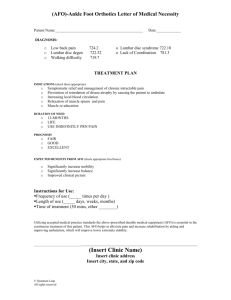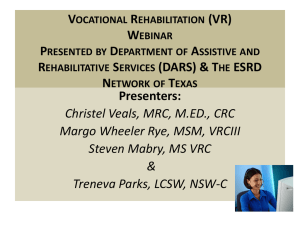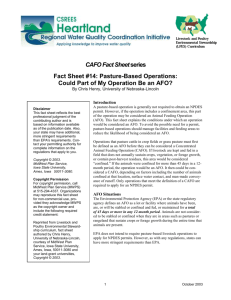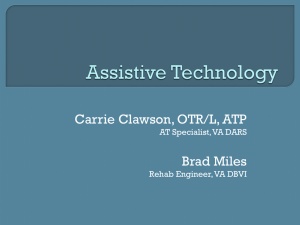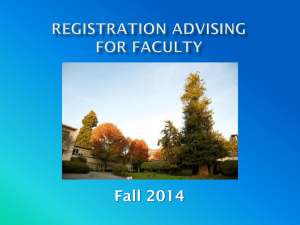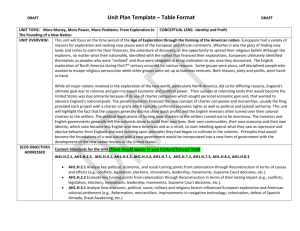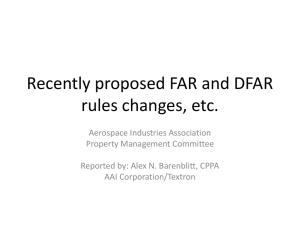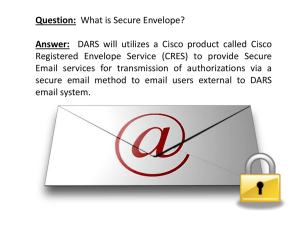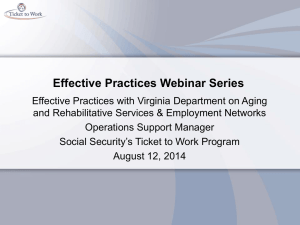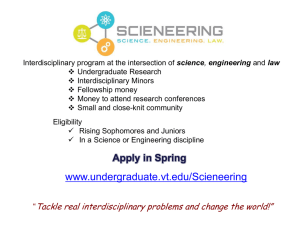Vocational Rehabilitation and The Transition Process
advertisement
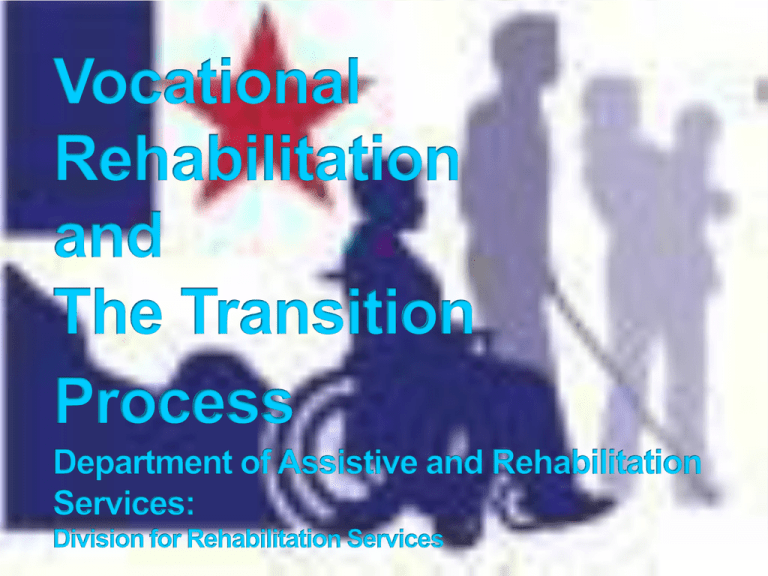
Transition AFO Overview Of DARS Transition Program Emphasis on Collaboration Positive Outcomes for All Partners Experiences Question and Answer Transition AFO The Goal of Transition Planning Transition planning is a process that helps prepare students for life after leaving school. Such planning helps to minimize barriers that an individual could encounter in the transition phase from school to adult life. Transition AFO Depending on the student’s needs, the process may involve learning about and preparing for: Adult services Independent living Community participation Transition AFO The Coordination and Delivery of DRS Services is Based on the Philosophy that Each Student Should Have Opportunities to: have a meaningful life, Success make informed choices about where to live, work and play, and fully participate in, and be a contributing and respected member of, the community. Transition AFO Transition Planning Services are provided to eligible students with disabilities in both public and private schools. Any individual with a disability can apply with DRS to see if they are eligible for services. Transition AFO Prior to graduation from high school, students receive services provided by public education. DRS services can support public education services while the student is in school, as well as continue during the summer and after graduation. Transition AFO Uniqueness of the Program The Transition Program is a coordinated effort between public education and public agencies to provide a seamless move from the educational setting to the adult world of work. TVRC #803 Transition AFO The Transition Program is designed to enhance and supplement services available through other agencies. The Transition Program works with the Adult Vocational Rehabilitation Program to serve as a basis for a lifetime of independence and productivity in the adult world. Transition AFO DRS Vocational Rehabilitation Process Initial Contact Application Eligibility Determination Eligible Ineligible Student’s Individualized Plan for Employment (IPE) DRS Planned Services Employment Transition AFO To be eligible for Vocational Rehabilitation Services, an individual must: have a physical or mental disability that constitutes or results in a substantial impediment to employment AND Transition AFO The individual must also: be capable of achieving an employment outcome, after receiving VR services; and require VR services to prepare for, enter, engage in, or retain gainful employment consistent with the individual’s strengths, resources, priorities, concerns, abilities, capabilities, interests, and informed choice. Transition AFO DRS Services DRS counselors function as consultants to education personnel to assist in the transition planning process for students with disabilities. Transition AFO Upon completion of high school, individuals receive services based on mutually agreed upon employment goals. Services may include, but are not limited to: medical, psychological and vocational evaluation counseling and guidance training to learn job skills and appropriate work behaviors rehabilitation technology devices and services to improve job functioning job placement assistance Transition AFO The Parent or Guardian Can Support a Smooth Transition Process by: Actively participating in the development of the student’s Individualized Education Program (IEP). Knowing what training programs and employment options are available for the student. Talking with the student, teachers, and service providers about abilities, choices and opportunities. Transition AFO Transition is a cooperative process. Family, teachers, agencies and students each have an important role. By working together, students with disabilities can achieve success in the adult world. Transition AFO TVRC Crain HSSEE Canyon HS 77 Palo Duro HS 158 Randall HS 108 Richard Millburn 15 *Bushland HS (33) 358 Applications Taken 11= 3.1% TVRC Widener Amarillo HS Caprock HS River Road HS Tascosa HS HSSEE 94 156 37 158 445 Applications Taken 23= 5.2% High School Special Education Enrollment (HSSEE) Transition AFO 1). Work in collaboration with the High schools to achieve our mutual Goal, to assist the students to be successful in Life after High School. 2). Give all seniors with disabilities, including, Special Education, Auditory Impairments, and 504, the opportunity to apply for DARS services. 3). Refer students who are juniors for services during their junior year. 4).Increase opportunities for employment experiences for students while they are still attending high school. Transition AFO 2). The primary goal of the transition program is to give all seniors with disabilities, including, Special Education, Auditory Impairments, and 504, the opportunity to apply for DARS services; and for the DARS counselor to develop an Individual Plan for Employment for eligible Seniors interested in services prior to graduation. An Individual Plan for Employment (IPE/Plan) requires the student and the DARS counselor to agree to a viable vocational goal with consideration of the student’s strengths, abilities and interests. The IPE/Plan identifies the steps necessary to reach that goal, and the type of services needed. Early referral is critical to this process, as it allows the student and the DARS counselor time to establish a trusting relationship to complete the appropriate assessments and to explore career options prior to developing the IPE/Plan. To help ensure that all eligible seniors have the opportunity to participate in a quality assessment and planning process, a deadline of January 15th for senior referrals has been established. Exceptions will be considered on a case-by-case basis. It is important to consider that because late referrals limit the time available to establish a quality relationship, students who are referred late are less likely to maintain contact with DARS counselor resulting in unsuccessful closures Transition AFO 3). Refer students who are juniors for services during their junior year. Early referral allows the students to participate in summer activities such as, summer job experiences between their junior and senior year, job club experience focused on soft skills training and referral to programs with community partners when appropriate. Early referral allows the student and the DARS counselor time to establish a trusting relationship, to complete appropriate assessments, and to explore career options with consideration of student’s strengths, abilities and interests prior to developing the IPE/Plan. Transition AFO 4). Increase opportunities for employment experiences for students while they are still attending high school. Achieving this goal requires a high level of collaboration between the DARS Transition Counselor and the High School Transition Team. The DARS counselor will meet with the VAC, CAP, CTED and other members of the transition team to target employers and develop strategies for the individual student’s success. Transition AFO State Performance Plan (SPP)- Indicator 13 State Performance Plan (SPP)- Indicator 14 Invitation to IEP TEAM meeting A. Enrolled in higher education Provide Job Ready Guidance- Social Skills, Vocational Training programs at High School level, etc. within one year of leaving high school. B. Enrolled in higher education or competitively employed within one year of leaving high school. C. Enrolled in higher education or in some other postsecondary education or training program; or competitively employed or in some other employment within one year of leaving high school. Transition AFO Primary Role Secondary Role DARS services related to Information/Referral source “employment” Assessments, such as Vocational Evaluation to determine career options based on natural talents, interest and aptitude; On the Job Training opportunities; Summer Youth Employment; Job Shadowing opportunities; individualized Job Placement services; etc Services are Unique to the Student’s needs MH and developmental Disability community agency; Education services through college/university; Social Security; Independent Living Services; Texas Tuition Waiver (Deaf and Hard of Hearing); etc. Will direct the referral personVAC; Parents; Special Ed Staff; etc to the appropriate resource that would best suit or meet the individuals needs. Transition AFO Please See HO TVRC #803 Regions Covered by DRS Transition Specialists TVRC #803 Transition AFO DRS Division for Rehabilitation Services Andrew Trevino, MS Valarie Robbins, MS, CRC Area Manager Unit Program Specialist AMARILLO 5809 S. Western, Ste 255 Amarillo, Texas 806-351-3830 PAMPA 121 S. Gillespie Pampa, Texas 806-669-8450 Transition AFO 1. DARS is the state agency that helps people with disabilities go to work. T F 2. Every student who qualifies for Special Education Services qualifies for DARS. T F 3. Getting a job is the goal of every DARS plan. T F 4. My counselor decides what my job goal is and what services I will get. T F 5. I can choose my own goals and can write my own plan for employment. T F 6. My counselor must support whatever it is I want to do. T F 7. If I am eligible for DARS, I don’t need to apply for any other services. T F 8. If I receive Social Security or SSI disability benefits I am eligible for DARS. T F Transition AFO 9. If I receive Social Security or SSI, I must report all of my earnings even if I am still in school. T F 10. My DARS counselor can explain how working will affect my benefits. T F 11. DARS will pay my living expenses while I am training for a job. T F 12. If I quit my job, DARS is required to help me find another one. T F 13. I am responsible for arranging my own transportation to and from work. T F 14. I am responsible for staying in contact with my DARS counselor. T F 15. I should contact my DARS counselor if I have any concerns or problems that might affect my job. T F 16. I am able to choose which agencies provide my services. T F 17. Once I have signed up with DARS, my case stays open forever. T F Transition AFO
